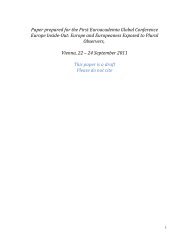Emanuel Crudu The EU and Collective Identities ... - Euroacademia
Emanuel Crudu The EU and Collective Identities ... - Euroacademia
Emanuel Crudu The EU and Collective Identities ... - Euroacademia
Create successful ePaper yourself
Turn your PDF publications into a flip-book with our unique Google optimized e-Paper software.
Patrimonial experienced European identity<br />
- wide <strong>and</strong> inclusive<br />
- dialogical<br />
- creative/magmatic<br />
- interiorized by the masses<br />
- modus vivendi<br />
- in relation of openness with other<br />
identities from which receives <strong>and</strong> with which shares<br />
patrimonial values<br />
- generous imagined geography<br />
- detectable as European experience<br />
- dynamic, variable <strong>and</strong> non-essentialist<br />
- in flow<br />
- involves narratives of belonging<br />
- assertive <strong>and</strong> dialogical self-definition<br />
Politicized <strong>EU</strong>ropean identitarian appropriation<br />
- limited <strong>and</strong> exclusive<br />
- tendency for self-closure<br />
- selectively mimetic<br />
- elitist/’failed Europeanization of the masses’<br />
(Majone 2009: 22-45)<br />
- potential corporatist type of identity<br />
- in explicit relation of internal <strong>and</strong> external<br />
otherings as hierarchizations on a reifying scale of<br />
Europeaness<br />
- variable exclusive geography<br />
- resulted from the efforts of elites to ‘isolate<br />
bounded social formations or communities’(Paasi<br />
2001, 19)<br />
- groupist with visible inescapable<br />
primordializations (Brubaker <strong>and</strong> Cooper 2000)<br />
- in search<br />
- involves claims facilitating politically biased<br />
inclusion/exclusion nexuses<br />
- apophatic self-definition<br />
<strong>The</strong>re is a lot of agreement that a substantialist determination of <strong>EU</strong>ropean identity cannot be accepted. Yet a<br />
narrative, non-substantialist manifestation of <strong>EU</strong>ropeaness is not in many aspects more inclusive. One argument<br />
against the <strong>EU</strong>ropean identity is that it provides no parsimony <strong>and</strong> is very hard to be delimited in consistent empirical<br />
terms (Risse 2004). Yet hard efforts are sometimes made to prove the contrary. However what this paper is trying to<br />
argue is rather that the dialogical ground for identitarian contestation inside the European Union is not yet set <strong>and</strong><br />
therefore the risk relies exactly in the exclusive potential that it involves in unsettled disputes.<br />
Politicized identitarian narratives inside the <strong>EU</strong> are in a faze of pre-contestation, meaning by that they rather set the<br />
conditions of possibility for a potential future <strong>EU</strong>ropean identitarian articulation when the parameters of what <strong>EU</strong><br />
st<strong>and</strong>s for in Europeans citizens’ identifications will be clearer. Politicizing identities when the politicization of the <strong>EU</strong><br />
itself is ’messy’ (Majone 2009: 7) might not be the wisest thing to do. Many scholars argued that the articulation of a<br />
European idea comes from contestation over its core features (Eder 2005; Rovisco 2010) <strong>and</strong> confrontation in relation<br />
with its many ‘others’(Delanty 1995, 1995a, 2003, 2003a, 2006). At this time an important attention should be<br />
therefore given to the ‘correctness’ of European distinctiveness <strong>and</strong> the uncontrolled effects of exclusion that it<br />
involves. Castoriadis (1991, 1998) named as typically European the interest, curiosity <strong>and</strong> desire to listen <strong>and</strong> learn<br />
from other cultures. This feature stood for the radical innovation in shaping the European social imaginary<br />
significations. This paper asks if the contemporary Europe is self-reflexively listening to its others or finds it sufficient<br />
to name them<br />
<strong>The</strong> <strong>EU</strong>’s Endogenous Identity or the ‘Western Genetic Soup’: A Neo-Medieval<br />
Empire<br />
It is a widespread though not undisputed argument nowadays that the <strong>EU</strong> is or is becoming a normative power.<br />
That is to make reference to a variable normative commonality or to a set of shared values that the <strong>EU</strong> is empowering<br />
<strong>and</strong> promoting. Among many normative instruments of <strong>EU</strong>’s foreign policy, the enlargement was considered the most<br />
successful one as it proved to be a powerful leverage through credible incentives to encourage political change <strong>and</strong><br />
foster substantive democratization (Schimmelfennig <strong>and</strong> Sedelmeier 2005; Vachudova 2005). As before the ‘90s the<br />
enlargement was occasional <strong>and</strong> sporadic, after the end of the Cold War, the enlargement was understood more as a<br />
function of Western European institutions <strong>and</strong> particularly of <strong>EU</strong> as an emerging pan-European policy shaper. Yet,<br />
enlargement also reminded most of the <strong>EU</strong> students that the formation of the <strong>EU</strong> institutions is based on particular <strong>and</strong><br />
historically circumstantial experiences that lead to a specific model of institutionalization. That is to say that specific<br />
identitarian narratives, norms <strong>and</strong> values are endogenous to <strong>EU</strong>’s formation <strong>and</strong> gradual institutionalization. In his<br />
latest book, Johan P. Olsen (2010) refers to a Western ‘genetic soup’ whose pre-existing components define the viable<br />
political choices in the development of new institutions. This ‘genetic soup’, in Olsen’s terms, ‘includes historically<br />
developed institutional arrangements, st<strong>and</strong>ard operating procedures, practices, rules, roles, identities, normative <strong>and</strong><br />
causal belief systems, <strong>and</strong> resources <strong>and</strong> capabilities’(Olsen 2010: 96). In this line of arguments, the <strong>EU</strong> as<br />
institutionalization <strong>and</strong> policy process ‘is based on west European experience’ (Wallace et al. 2010: 5). This statement<br />
is repeatedly made starting the ‘90s by Hellen Wallace as a preliminary observation to her overview of the <strong>EU</strong> in all<br />
4











